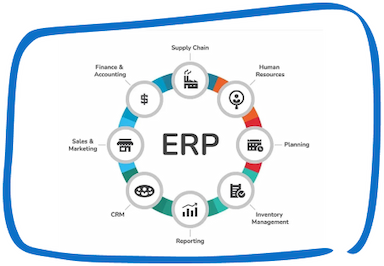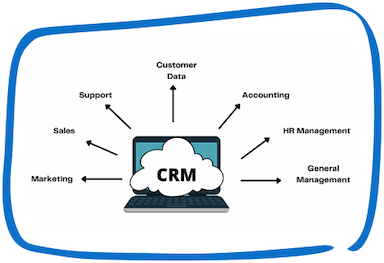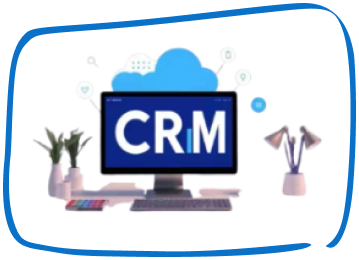In today’s fiercely competitive business landscape, the significance of customer relationship management (CRM) has never been more pronounced. A CRM system stands as a potent instrument that aids companies in orchestrating their interactions with customers, streamlining operations, and ultimately amplifying their return on investment (ROI).
Through the systematic organization and monitoring of customer data, a CRM system can furnish valuable insights into customer behavior, preferences, and requirements. These insights, in turn, empower businesses to make more informed decisions and deliver superior service. In this blog post, we will delve into the ways in which companies can optimize their ROI using a CRM. Also, we will see how to harness its diverse functionalities to stimulate growth, boost sales, and enhance customer engagement.
According to a study conducted by Nucleus Research, businesses can anticipate an average ROI of $8.71 for every dollar invested in CRM. This represents a substantial return on investment, and the reasons behind it are readily apparent.
A CRM system equips companies to manage their customer relationships with greater efficiency and effectiveness. This significantly resulted in heightened customer retention rates, increased customer satisfaction, and a surge in sales.
7 Strategies for a Successful CRM system Implementation
In today’s business landscape, there’s no denying the indispensable role that a CRM system plays in your entire organization. From enhancing data management to optimizing workflows and boosting revenue, the advantages of a CRM are extensive and far-reaching. However, these benefits can remain untapped if your CRM initiative doesn’t get off the ground. The following strategies are designed to prevent such missed opportunities and help you extract the maximum value from your CRM project.
1. Promote Widespread CRM Adoption:
To begin, it’s crucial to understand that the effectiveness of software solutions is contingent on the quality of the data they house. When CRM solutions are embraced across the entire organization, they establish a shared repository of accurate information about prospects and the incoming sales pipeline. This approach enhances visibility into the sales funnel. Thus, it simplifies the process for sales representatives to identify leads that are ripe for follow-up.
Emphasize Data Documentation:
These advantages, however, can only be realized if every employee consistently records their interactions with prospects in the CRM. Surprisingly, this best practice is not as commonplace as one might assume. According to HubSpot’s State of Inbound Report, 22% of salespeople neglect to log sales activities in their CRM, and 40% resort to disjointed systems like email and notes to store customer data. While we can hope that these statistics are improving, it’s prudent to address this issue proactively. By establishing clear protocols for CRM usage and providing comprehensive training to all employees, you ensure that your CRM actively facilitates the progression of deals.
2. Facilitate Alignment Between Your Sales and Marketing Teams
It is imperative that your sales and marketing departments collaborate seamlessly. However, quite often, these two teams find themselves in competition, leading to a sense of animosity. This division can result in crucial information not being shared, leading to missed opportunities and lost deals.
While mandating the use of CRM by all teams is a step toward aligning sales and marketing, successful CRM implementation requires a deeper approach. To achieve this, consider conducting joint CRM training sessions for both your marketing and sales teams. These sessions should focus on how each group utilizes the CRM and how they can enhance collaboration on this platform in the future.
3. Leverage Reporting Features
CRM systems not only provide convenient access to sales and customer data but also offer robust reporting capabilities that enable organizations to assess the performance of their sales teams effectively.
These readily available reports empower organizations to analyze and refine their sales processes swiftly. This certainly allows for a culture of experimentation and learning. For instance, CRM reporting can break down the quantity and stage of each opportunity within the sales pipeline. As a result, it will offer sales representatives clear guidance on where to strategically concentrate their efforts.
Furthermore, CRM reporting enables sales managers to enhance forecasting and strategy by examining the number of sales closed in the previous month and their sources. Transparency in the sales process simplifies the proactive identification of areas with potential for growth or risk mitigation.
Given that time wastage, inefficiencies, and lost deals cost companies millions each year. The insights gained from CRM reporting underscore the clear return on investment (ROI) of your CRM initiative.
4. Ensure Seamless Integration of Your CRM system with Key Software Programs
To maximize your return on investment (ROI), it is imperative that your CRM system integrates seamlessly with the essential software solutions your organization relies on. For instance, if you utilize QuickBooks for managing accounts receivable, it is essential that your CRM software synchronizes effortlessly with QuickBooks. This integration offers several advantages, one of which is expediting the deal closure process for sales representatives. They can create quotes, issue invoices, and record payments directly within the CRM, leading to quicker transactions.
Email integrations are also highly advantageous for sales representatives. They reduce the time spent toggling between programs and minimize distractions. When reps can access CRM data directly within email platforms, they gain the ability to personalize their communications with prospects. Thereby enhancing the effectiveness of their nurturing efforts.
5. Harness Workflow Management Features
Leveraging the workflow management tools inherent in your CRM system streamlines processes and mitigates the risk of costly errors. The implementation of a structured workflow ensures that employees consistently follow a predefined sequence, preventing inadvertent omissions. The CRM system itself alerts users if any essential information is missing. Furthermore, data entered in one section of the CRM can automatically populate relevant fields in another, eliminating the need for redundant data entry.
A customizable CRM system is especially valuable in this context, as it enables the automation of tasks tailored to your specific business needs. By aligning your CRM solution with your unique sales processes, your team can efficiently close more deals in less time.
6. Prepare Your Sales Team for Effective Upselling
While acquiring new customers holds importance, it’s the loyal customer base that sustains your business. An excellent way to fully leverage your CRM system is to closely examine the complete customer journey.
By consolidating each customer’s communication and transaction history into one accessible repository, it becomes simpler to pinpoint opportunities for repeat business. Thus, you can prioritize these within your sales teams. Imagine being able to filter your customers based on the date of their last order to identify those who might be ready for a new purchase. With this knowledge, you can follow up with each customer at the opportune moment when they are most inclined to make a purchase.
7. Emphasize Mobile Capabilities
Establishing Clear Objectives: To attain the desired ROI, it is imperative to define clear and measurable goals. These objectives may encompass enhancing customer satisfaction, reducing churn rates, or increasing sales. Utilize your CRM system to monitor these metrics, track progress, and adjust strategies as necessary.
In today’s business landscape, the ability to access data remotely holds paramount importance, especially if your sales representatives frequently engage with clients outside the office environment. To derive maximum value from your CRM initiative, opt for a solution that provides mobile applications. This will enable reps to log sales activities in real-time, regardless of their location. With a mobile CRM, closing sales becomes more efficient and flexible, as employees always have immediate access to the requisite data, facilitating timely decision-making and action.
Calculate the ROI of a CRM system:
To determine your return on investment (ROI) for your CRM, follow these steps:
- Subtract the total costs associated with your CRM investment, which may include licensing fees, configuration, training, and ongoing maintenance expenses, from the total benefits gained.
- Measure benefits through metrics such as increased revenue, reduced costs, improved customer satisfaction, and other relevant factors.
- Divide the net benefit by the total costs and multiply the result by 100 to obtain the ROI percentage.
Keep in mind that your CRM system is a dynamic tool that evolves alongside your business. Continuously monitor and optimize your CRM investment by refining workflows, adjusting strategies, and leveraging data insights. Regularly reassess your key performance indicators (KPIs), solicit feedback from your teams, and explore new features and integrations that enhance the effectiveness of your CRM.
To sum up
In summary, a CRM is an indispensable tool for businesses seeking to enhance customer relationships and operational efficiency. To maximize the benefits of your CRM, it’s crucial to select the right platform. Also, it’s important to tailor it to your specific needs and provide effective training to your employees.
If you’re in search of a reliable CRM solution, Penieltech offers Elate CRM services, complete with integration and training support. With our assistance, you can optimize your CRM and achieve your business objectives more efficiently than ever before. We look forward to assisting you in this journey.
Speak with Our Team!
4.9 Stars
1k+ reviews on






